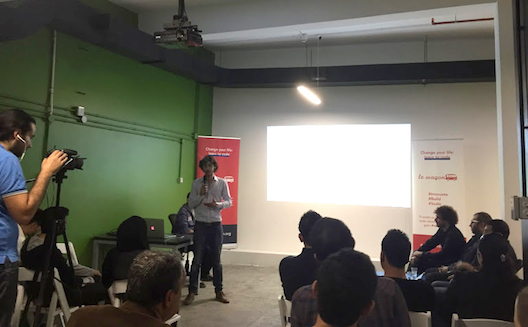Le Wagon deploys first batch of coders in Beirut


General manager of Le Wagon El Khoury speaks out (Image via Ayman Farhat)
Coding school Le Wagon graduated its first batch of Beirut-based participants.
A restaurant booking app (BAG), a hang-out app for university students (IWNTO), a therapeutic art platform and an app connecting patients with psychologists (ePsych) ; these were the projects "pitched" at thedemo day on November 14.
"The main idea of our programs is not to build startups, but to graduate developers who have the skills they need to enter the marketplace," said Le Wagon general manager Malik El Khoury. "Some of the apps may be really good, but not to form a startup; it's to show their skills as developers for a job opportunity, or a partnership opportunity as CTO of a startup."
Launched in France in 2012, the academy has graduated hundreds of coders, some of which have grown into prominent entrepreneurs, like Pierre Hervé and Olivier Xu, founders of Kudoz, a French job search platform that functions like Tinder, and the four founders of MedPics, a photo sharing app for healthcare professionals.
"We have 20 to 30 graduates who are now in the seed stage of their venture," El Khoury added.
Filling a market gap
Le Wagon aims to make students market-ready over the course of nine weeks.
“There are large numbers of computer science graduates who are not eligible for software development,” said Ayman Farhat, one of the teachers at Le Wagon and Wamda’s software engineer. “They end up in another career, as work in IT administration and support, which is not what the market needs.”
Similar to other coding initiatives, like Arab Code and Coded, Le Wagon’s mission is to bridge the gap between a university education and the marketplace.
"In the fast-paced world of tech, what you learn today in university becomes obsolete in two or three years,” El Khoury said. “And when you have three of four years of university, what you learn in the first year will become obsolete in the second or third year." Another important factor, added Farhat, was to having “people who are willing to work on themselves. It’s all about continuous learning in this field, and if you stop learning, your skills become obsolete very easily.”

The Le Wagon team with students.
Challenges?
An intensive three-months program, five days per week, from 9 a.m. to 7 p.m. can certainly be overwhelming. Students need to be job-free and fully committed.
"The biggest challenge for us was motivation and commitment from the students, because our program is kind of hard and heavy,” El Khoury said. “It's 405 hours of courses, and not everyone is able to put in that amount of commitment and concentration."
Indeed, the number of students had dropped from 14 to eigh by the end of the program.
"It's more intensive than university, or work,” El Khoury said. “They were not prepared for that."
Finding qualified teachers in Lebanon proved difficult, so El Khoury looked overseas.
"We had to bring our teachers from the US and Belgium to be able to do a proper course," he said.
Could he have used university instructors?
"No, not at all. University teachers have theoretical background but they never practice. We need people who know how to code in the startup world."
What's next?
"We're expanding to other areas in Lebanon, but we are still in preparations," said El Khoury. Meanwhile, Le Wagon is accepting applications for its second semester in Beirut, scheduled for April 2016.
 When Maysaa first started writing for the AUB magazine as a student, she was searching for ways to make journalism more fun and interesting than the usual old-school narrative. After writing for several magazines, she became fascinated by the word "entrepreneurship" and decided to focus all of her energy on researching and writing about it. You can reach her at maysa@wamda.com and on Twitter @MaysaaAjjan.
When Maysaa first started writing for the AUB magazine as a student, she was searching for ways to make journalism more fun and interesting than the usual old-school narrative. After writing for several magazines, she became fascinated by the word "entrepreneurship" and decided to focus all of her energy on researching and writing about it. You can reach her at maysa@wamda.com and on Twitter @MaysaaAjjan.


